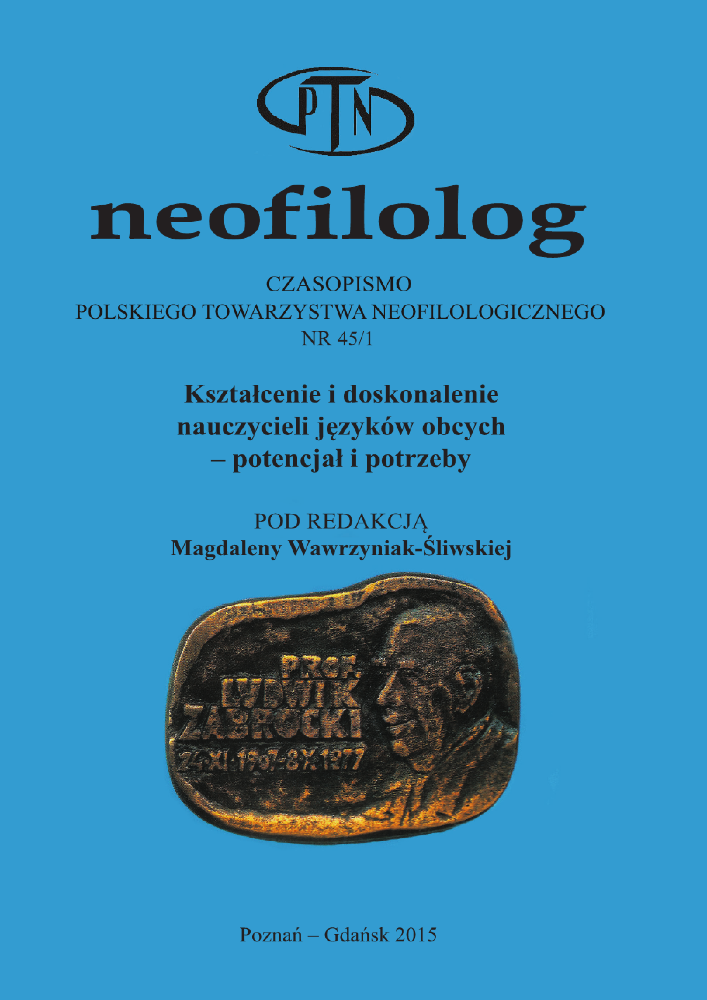Résumé
The subject of this article is the concept of learning by teaching used for
the training of teachers of German. Foreign language teacher training is
currently no doubt one of the most important challenges resulting from
the educational policies of countries within the European Union. In Poland,
the necessity for remedial, preventive or promotional actions with
regard to the teaching of foreign languages seems to pertain first of all
to the teachers of German (and their training facilities), as the justification
for German’s presence in the Polish schools is increasingly being
questioned. Unfortunately, there are numerous examples in school
practice which show that the contemporary approach to the teaching of
German as a foreign language continues to follow a traditional, transmission
model, with great perseverance and consistency.
In order to change this situation, it is necessary to find some effective
educational solutions for foreign language teacher training. The search
should focus on those educational tools which will enable teachers-tobe
to meet their teaching goals and conduct the teaching process in line
with the current theories of language teaching. One of many such tools,
which I have decided to examine more closely, is the concept of learning
by teaching (Lernen durch Lehren), initiated by Jean Pol Martin.
This paper presents the main assumptions of the concept of LdL and describes
a training programme (developed following the LdL approach) carried
out with the students of faculty of German who are future teachers of
German. The conclusions drawn seem quite promising for teacher training.
Références
Brzezińska, A. I. 1999. „Refleksja w działalności nauczycieli” (w) O nowe podejście w kształceniu nauczycieli (red. I.A. Brzezińska, D. Klus-Stańska i A. Strzelecka). Warszawa: MEN: 37-52.
Brzezińska, A. I. 2005. „Jak przebiega rozwój człowieka” (w) Psychologiczne portrety człowieka (red. I.A. Brzezińska). Gdańsk: Gdańskie Wydawnictwo Psychologicz-ne: 21-40.
De Corte, E. 2013. „Historyczny rozwój myślenia o uczeniu się” (w) Istota uczenia się. Wykorzystanie wyników badań w praktyce. (red. H. Dumont, D. Istance i F. Be-navides,). Warszawa: Wolters Kluwer Polska SA: 60-108.
Dylak, S. 2000. „Konstruktywizm jako obiecująca perspektywa kształcenia nauczycieli” (w) Współczesność a kształcenie nauczycieli. (red. H. Kwiatkowski, T. Lewowicki, S. Dylak). Warszawa: Wydawnictwo WSP ZNP. http://www.cen.uni.wroc.pl/teksty/konstrukcja.pdf DW 2015-05-17.
Kelchner, R., Martin, J-P. 1998. „Lernen durch Lehren“ (w) Englisch lernen und lehren – Didaktik des Englischunterrichts (red. J.P. Trimm). Berlin: Cornelsen: 211-219.
Klus-Stańska, D. 2010. Dydaktyka wobec chaosu pojęć i zdarzeń. Warszawa: Wydawnic-two Akademickie ŻAK.
Lewicka, G. 2007. Glottodydaktyczne aspekty akwizycji języka drugiego a konstrukty-wistyczna teoria uczenia się. Wrocław: Oficyna Wydawnicza ATUT.
Martin, J. P. 1985. Zum Aufbau didaktischer Teilkompetenzen beim Schüler. Tübingen: Narr.
Martin, J. P. 1986. „Für eine Übernahme von Lehrerfunktionen durch Schüler“. Praxis 33: 395-403.
Martin, J. P. 1988. „Schüler in komplexen Lernumwelten. Vorschlag eines kognitionspsychologisch fundier-ten Curriculums für den Fremdsprachenunterricht“. Praxis 35: 294-302.
Martin, J. P. 1994. Vorschlag eines anthropologisch begründeten Curriculums für den remdsprachenunterricht. Tübingen: Narr.
Michońska-Stadnik, A. 2013. Teoretyczne i praktyczne podstawy weryfikacji wybranych teorii subiektywnych w kształceniu nauczycieli języków obcych. Wrocław: Wydaw¬nictwo Uniwersytetu Wrocławskiego.
Murphy, J. M. 2001. „Reflective teaching in ELT” (w) Teaching English as a second or foreign language (red. M. Celce-Murcia). Boston MA: Heinle & Heinle: 499-514.
Olssen M. 1996. „Radical Constructivism and its Failings: Anti-realism and Individual-ism”, British Journal of Educational Studies 3: 275-295.
Piaget, J. 1996. Studia z psychologii dziecka. Warszawa: PWN.
Wysocka, M. 2003. Profesjonalizm w nauczaniu. Katowice: Wydawnictwo Uniwersytetu Śląskiego.
Licence
© Magdalena Białek 2019

Ce travail est disponible sous licence Creative Commons Attribution - Pas de Modification 4.0 International.
Auteurs :
Les auteurs de textes acceptés pour publication dans la revue Neofilolog sont tenus de remplir, signer et renvoyer à l'adresse de la rédaction, un accord sur l'octroi d'une licence gratuite pour les œuvres, avec obligation d'accorder une sous-licence CC.
En vertu de cet accord, les auteurs des textes publiés dans la revue Neofilolog accordent à l'Université Adam Mickiewicz de Poznań une licence non exclusive et gratuite et permettent l'utilisation de la sous-licence Creative Commons Attribution-NoDerivatives 4.0 International (CC BY-ND 4.0).
Les auteurs se réservent le droit de disposer librement de l'œuvre.
Utilisateurs :
Les utilisateurs d'Internet intéressés ont le droit d'utiliser les œuvres publiées à partir de l'année 2017 sous réserve des conditions suivantes :
- reconnaissance de la qualité d'auteur - l'obligation de fournir des informations sur la qualité d'auteur, le titre, la source (liens vers l'œuvre originale, DOI) et la licence, ainsi que l'œuvre distribuée ;
- sans créer d'œuvres dérivées - l'œuvre doit être conservée dans sa forme originale, p. ex. les traductions ou les interprétations ne peuvent être distribuées sans le consentement de l'auteur.
Tous les textes publiés sont soumis au droit d'auteur.
Autres :
L'Université Adam Mickiewicz de Poznań se réserve le droit à la revue dans son ensemble (mise en page, forme graphique, titre, conception de la couverture, logo, etc.).
.
